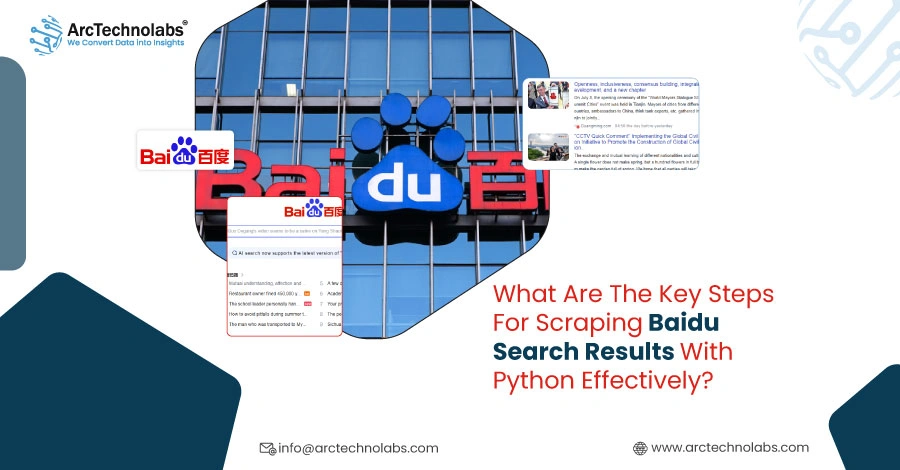
Introduction
In today’s data-driven ecosystem, global search engines like Baidu have emerged as treasure troves of strategic insights, especially for companies targeting the Chinese digital market. However, while Google scraping has become almost mainstream, Scraping Baidu Search Results With Python presents a more niche and high-value opportunity.
If you're trying to understand Chinese consumer intent, monitor brand reputation, or analyze search demand in China, Baidu becomes a critical touchpoint. This blog delves into the key steps and tools required to scrape Baidu effectively using Python, while also highlighting ethical practices, anti-bot precautions, and real-world applications.
The Strategic Importance of Baidu Scraping

Baidu remains the leading search engine for millions of Chinese internet users, serving as a gateway to local trends, product sentiment, and brand discovery. For global businesses seeking to understand and penetrate the Chinese digital landscape, Baidu holds unparalleled value.
By choosing to Scrape Baidu Search Results With Python, companies can unlock targeted insights that fuel smarter market decisions, digital outreach, and product positioning strategies across China’s unique online ecosystem.
Here’s why Baidu scraping should be part of your digital strategy:
- Localized Market Intelligence: Access real-time user queries and content patterns directly from Baidu to understand local search trends.
- Competitor Benchmarking: Analyze competitor visibility and positioning across Baidu SERPs for better market adaptation.
- Data-Driven Expansion Planning: Use Python scraping to uncover keyword gaps and demand signals for launching or localizing offerings.
- Enhanced SEO & Content Strategy: Align your digital presence with actual user intent captured from Baidu search results.
Prepare Your Toolkit: Libraries and Environment Setup
To get started, you’ll need to install a few Python libraries that help with sending requests, mimicking browser behavior, and parsing HTML.
pip install requests
pip install beautifulsoup4
pip install fake-useragent
This forms the foundation of your scraping environment. The fake-useragent module helps mask your scraper’s identity, reducing the chance of being blocked.
Navigating the SERP: Extracting Relevant Data Points
Once you have the page response, the next step is to isolate the parts of the HTML that contain search results.
results = soup.find_all('div', class_='result')
for result in results:
title = result.h3.get_text(strip=True) if result.h3 else 'No Title'
link = result.a['href'] if result.a else 'No Link'
print(f"{title} - {link}")To resolve the final destination, use:
real_link = requests.head(link, headers=headers, allow_redirects=True).urlThat helps you clean up the data before storing or analyzing it.
Evading Detection: Anti-Scraping Tactics You Must Know
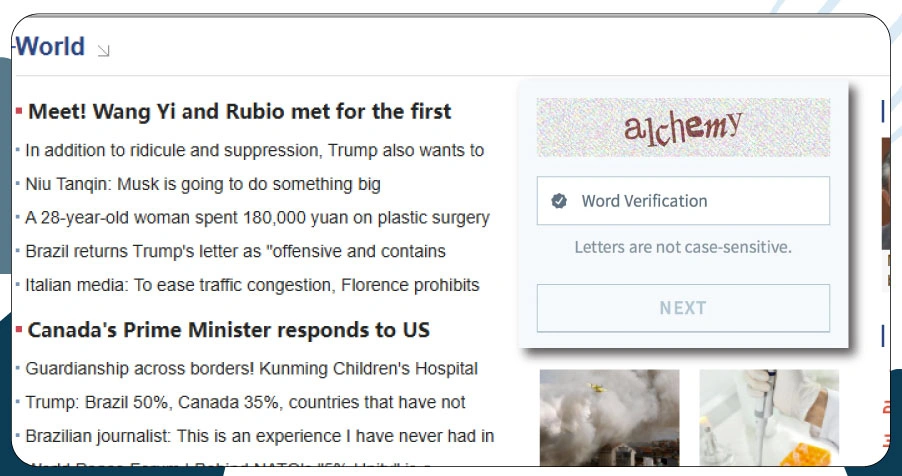
Baidu employs multiple anti-scraping techniques, including bot detection, CAPTCHA triggers, and IP blocks. These can be mitigated by implementing a few innovative strategies:
- Use rotating IP proxies
- Introduce randomized delays between requests
- Rotate headers and user-agents per session
- Limit the number of requests per minute
These practices are crucial when you conduct Baidu Web Scraping With Python, especially at scale. Without them, your script might be blocked or banned before it even completes the first batch of queries.
Structuring Data: From HTML to Insights
After successful extraction, store the data in a structured format for further analysis and processing. Pandas makes this incredibly easy:
import pandas as pd
data = []
for result in results:
title = result.h3.get_text(strip=True) if result.h3 else ''
link = result.a['href'] if result.a else ''
data.append({'Title': title, 'Link': link})
df = pd.DataFrame(data)
df.to_csv('baidu_search_data.csv', index=False)
This structured approach allows you to Scrape Baidu Organic Search With Python and immediately transform the data for analytics or machine learning applications.
Business Use Cases: Leveraging Baidu Scraping for Strategic Insights
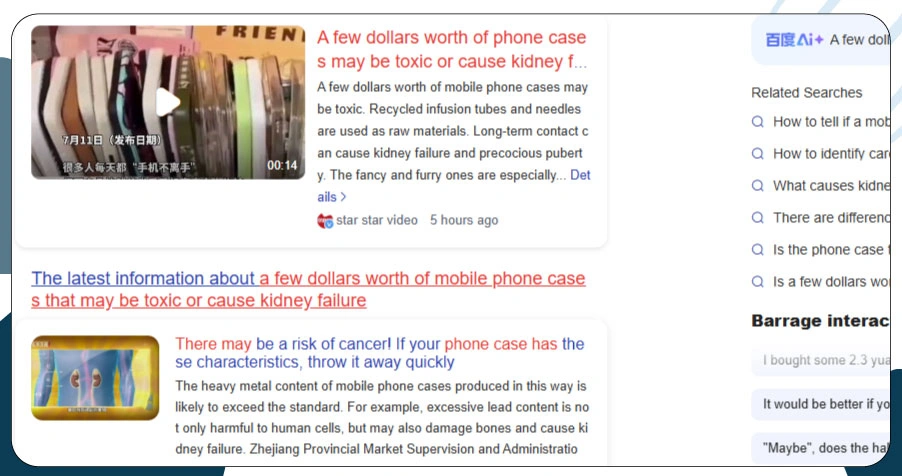
A wide range of business functions—from marketing and SEO teams to product research analysts—benefit from implementing Baidu scraping to uncover actionable insights.
Here are several impactful ways companies apply this technique:
- Keyword monitoring to assess brand visibility and track product mentions across Baidu search results.
- Trend analysis to explore emerging topics and shifts across industries and specific product categories.
- SEO intelligence by gathering local ranking data to optimize presence in the Chinese digital landscape.
- Competitor benchmarking to understand which brands rank higher, why they rank, and how their content strategies evolve.
A compelling use case lies in Scraping Baidu For Competitive Intelligence Data, enabling brands to decode competitor listing structures, top-performing content types, and changes in visibility over time.
Moreover, by using Python Baidu Scraping For Chinese Market Insights, businesses can uncover region-specific behavioral trends, helping them convert search behavior into precise, real-time customer sentiment insights.
Elevate with APIs: Advanced Solutions for Power Users
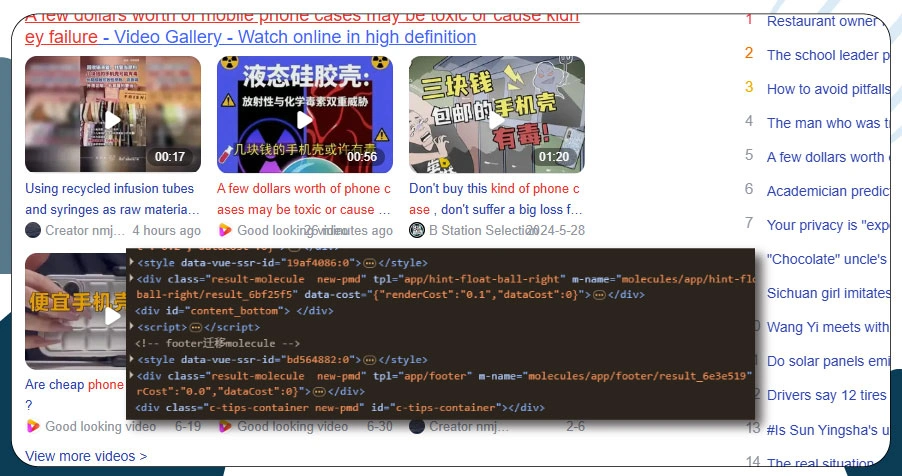
While manual scraping works well for smaller-scale tasks, it often falls short when handling large datasets, real-time updates, or mission-critical processes. In such cases, integrating an API becomes not just beneficial, but essential.
Developing a Baidu Scraper API In Python empowers businesses to:
- Automate scheduled data extraction processes with precision and accuracy.
- Feed real-time data into business intelligence dashboards for actionable insights.
- Reduce errors and improve efficiency through structured, repeatable workflows.
Whether you're developing internally or collaborating with external vendors, APIs offer the scalability, speed, and reliability needed for enterprise-grade operations.
Many forward-thinking organizations enhance their capabilities by combining Web Scraping API Services—connecting multiple data sources, such as Baidu, Weibo, and leading e-commerce platforms—into unified, high-performance data pipelines.
Why Do Businesses Turn to Web Scraping Services?
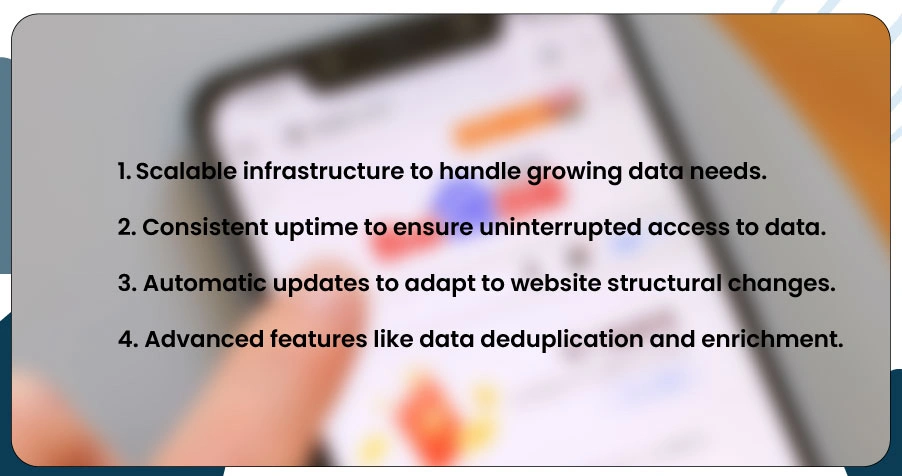
For many companies, especially those with evolving or large-scale data requirements, building and maintaining in-house scrapers can be both time-consuming and costly. That’s why numerous organizations turn to Web Scraping Services—a more efficient and reliable alternative that delivers clean, pre-structured data with ongoing maintenance and expert support.
These professional services typically include:
- Scalable infrastructure to handle growing data needs.
- Consistent uptime to ensure uninterrupted access to data.
- Automatic updates to adapt to website structural changes.
- Advanced features like data deduplication and enrichment.
To further enhance data acquisition, some businesses also leverage Mobile App Scraping Services, especially for platforms like Baidu. This allows them to capture real-time search patterns and performance metrics directly from Baidu’s mobile environment—an invaluable edge in mobile-first markets.
How ArcTechnolabs Can Help You?
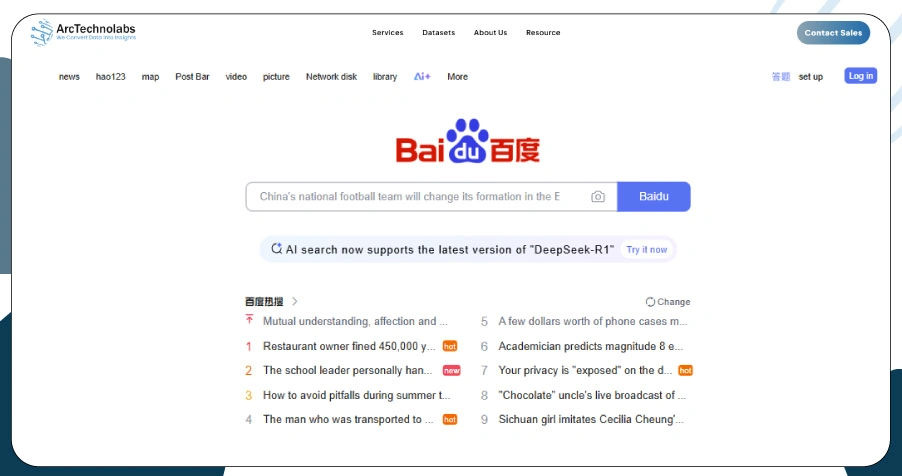
Whether you're building search monitoring workflows or exploring Chinese market trends, Scraping Baidu Search Results With Python can be resource-intensive without the right tools. ArcTechnolabs simplifies this process with tailored data solutions designed to save time and deliver accuracy.
Here’s how we support your data extraction needs:
- Customized scraper development tailored to your specific use case.
- Scalable infrastructure that adapts to your data volume.
- Continuous maintenance to handle structural page changes.
- Integration support with dashboards and internal systems.
- Data cleaning and translation to improve usability.
- Strategic guidance to ensure long-term success.
From one-time extraction to ongoing monitoring, our team ensures you receive reliable results without the need for technical complexity. We offer deep expertise in Baidu Scraper API In Python for organizations requiring scalable, automated pipelines.
Conclusion
Navigating the Chinese search ecosystem can be complex, but with the right tools and a clear strategy, it becomes an immense source of competitive advantage. By Scraping Baidu Search Results With Python, organizations can stay on top of emerging trends, monitor competitor moves, and identify content opportunities.
Pairing this with Python Baidu Scraping For Chinese Market Insights opens the door to localized SEO strategy, consumer behavior tracking, and product demand analysis. Contact ArcTechnolabs today to learn how our customized scraping solutions can help achieve your data-driven objectives in China.







